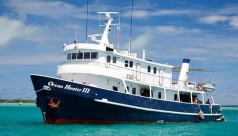Palau island Trips
The tour routes of the liveaboards in Palau cover largely the same area, with all of them taking in the headline dive regions and sites such as Blue Corner, German Channel, Ulong Channel, Peleliu and Jellyfish Lake. Blue Corner is a site with an excellent reputation and one that promises huge schools of fish, and bigger numbers of sharks than many divers will have seen before. As with many of the dive sites in Palau, this is a great opportunity for descending to the edge of a reef channel and securing yourself with a reef hook before letting all the breath-taking underwater action unfold.
German Channel is another site that promises to leave divers wide-eyed in an adrenalin-filled euphoria. This site includes a cleaning station where many manta rays, large and small, will stop by to be pecked clean. Sharks too will hang almost motionless in the water column as the busy cleaners nibble parasites from their skin. Huge schools of jacks, barracuda and eagle rays will join the throng, facing into the nutrient rich current that funnels through the channel. Peleliu is an island in the south with a dramatic and tragic history since it saw such heavy fighting and loss of human life in World War II. Nowadays it promises much more life-affirming and joyous experiences, as exemplified by dive sites such as Peleliu Wall and Peleliu Cut. At these places, you may spot hammerhead sharks, whale sharks, bull sharks, turtles and maybe even marlin.
In addition to fabulous sites, divers that visit Palau will also visit the incredible Jellyfish Lake where you can snorkel among thousands of pulsating jellyfish without being stung. You may also have the opportunity to go ashore for land visits to places of historical significance where you can learn more about Palau's role in World War 2. [More details on these dive sites: Palau].
Most trips are 6 or 7 nights long although there are some 10 night charters available. They are generally considered to be suitable for divers of all levels, although beginners need to be comfortable in conditions with strong currents and to learn how to use a reef hook. The guides are accustomed to showing the less experienced how to dive particular sites, so everyone can enjoy the spectacular marine life which makes Palau special. One positive feature of Palau liveaboard diving is that there is not a huge number of boats, so you will often have the dive sites to yourself and not be sharing them with many other groups.
> [More details:
Palau island Trips]
Deep South Trips
For liveaboard divers searching for a new and spectacle dive destination, far off-the-beaten-track, Palau's little known Helen Reef Marine Reserve could be an irresistible attraction. Its remoteness in the deep south of Palauan territorial waters and its protected status have help preserve an area buzzing with life. You will find pelagic fish such as tuna, trevallies and rainbow runners, as well as large oceanic sharks. On the reef there are dense schools of fish, reef sharks and mantas. Helen’s Reef is over a full day’s cruise from Koror so expeditions here tend to be longer (11-14 nights), exploratory in nature, and few in number. Yet they always sell out well in advance! Strong tidal currents make it suitable for advanced divers only.
> [More details:
Deep South Trips]










